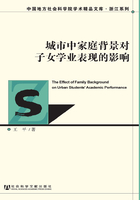
ABSTRACT
The relation between family background and children’s academic performance is a continuous theme in most of the existing research on intergenerational mobility. Based on a historical comparative study of urban poor families between two periods of time,this book analyses the causes of disadvantages in academic performance of urban poor children by comparison with upper middle class children. On the basis of fieldwork including in-depth interviews with urban poor children in the downtown area of Hangzhou,participant observation,and textual analysis,the study innovatively develops a model to illustrate two different causal routes:(1)In the macro context of social structure transition and educational system reform,what changes happened at the level of family and school,and how these changes continue or intensify the disadvantage of urban poor children in accessing educational opportunity;(2)From the microscopic point of view of adjustments in educational value in the culture,how the change of educational philosophy of teachers and parents impact directly on the formation of personal factors in urban poor children that relate to their academic performance. The study tries to prove that the structural and cultural changes as two parallel determining factors directly intensify the academic disadvantage of urban poor children in social transition.
In the binary routes of macro structure and micro cultural value,the study takes educational opportunity,family resource,and the control over schools’ educational resource as the structural factors,and takes academic performance-related personal factors,educational expectation,educational knowledge,and the value in educational decision-making as the cultural factors. Three empirical findings are presented by the historical comparison between different time periods and the horizontal comparison between different types of family background:(1)The polarization of family resources and the parents’ beliefs and values about education between different social strata,and the unequal distribution of high-quality schooling opportunities exacerbate the educational disadvantage of urban poor children;(2)The growing gap between different social strata in the family’s child rearing function and beliefs and values about education,and the unequal distribution of educational resources worsen the personal factors of urban poor children that relate to their academic performance;(3)With the stratification of educational opportunities and personal factors relating to academic performance,family background plays a more important role in children’s academic performance.
Using the compulsory education of urban poor children in the early 1990s and the late 2000s as case studies,the empirical study uses the qualitative methods and makes historical comparison of the impact of structural and cultural transition on family resources,child rearing function and educational philosophy of urban poor families,and the impact of compulsory education reform on the curriculum and extra-curriculum educational opportunities and teacher’s ideas of educational resource distribution during early market reform(1978-1992)and later market reform(post-1993). Based on the horizontal stratum differences between urban poor and upper middle class children in several factors,the study historically compares the changes of stratum differences between two periods of time,and demonstrates historical changes in the educational disadvantage of urban poor children. The comparison provides the methodological foundation for the theoretical findings of the study.
The conclusion clarifies that the strong program in cultural sociology provides an alternative causal explanation that focus on the transformation of educational philosophy in the mainstream culture,in addition to the causal explanation that focuses on structural and institutional variables in educational stratum differences.